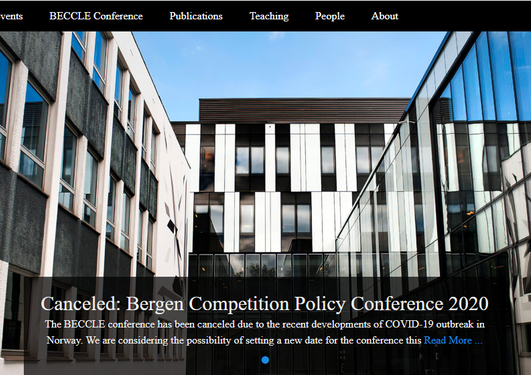Research at the Faculty of Law
The research at the Faculty of Law is anchored in robust academic communities within the traditional legal disciplines.

Main content
The Faculty of Law in Bergen has a wide research span which includes several internationally renowned academic communities. The research groups are at the core of the Faculty's research activity, and cover both the traditional legal disciplines and cross-cutting topics.
Our research actively pursue research questions related to the great societal challenges. In line with the Strategy for 2023-2030, the Faculty will strengthen its research effort on fundamental challenges in the legal system and on contemporary legal issues. We prioritize research oriented towards the international research front and research across traditional disciplinary boundaries.
The faculty's research strategy has three focal points:
- Climate and energy law
- Rule of law and international legal cooperation
- Legal framework for business and innovation
Research management
The Faculty is organised as one academic unit. The Pro Dean for Research is the head of the research organization and the PhD-programme. A Research Committee holds the overarching responsibility for ensuring quality and strategic development of our research activity and PhD-programme. A Research Ethics Committee works to promote knowledge of research ethics and handle cases of misconduct. The administrative section for research and academic affairs support the Faculty management and the academic staff with regards to external funding, project manangement, financial issues, HR in research, data management and research communication.
Read more at Faculty organisation and management | uib.no.
Research group organization
The Faculty was initially organised in research groups in 2005. All scientific employees are member of one or more research group, and some groups also include students or external researchers. The research group leaders have the administrative responsibility for communal academic activities and hold the role as consultative body on behalf of the community. There are extensive collaborations between the different research groups.
Read more at Research groups at the Faculty of Law | uib.no.
Research projects
The Faculty participates in and coordinates a range of externally funded projects, supported by the Research Council of Norway and other national and international funding bodies. Furthermore, the faculty has made collaboration agreements with public agencies and have been granted funding from private funds and actors in order to finance larger research projects in strategic priority areas.
Read more at Research projects at the Faculty of Law | uib.no
Research collaboration
Many of our research groups participate in extensive cross-faculty collaborations with centres and research projects at other faculties at the University of Bergen. This includes the Bergen Offshore Wind Center (BOW), Center for Climate and Energy Transformation (CET), Bergen Center for Competition Law and Economics (BECCLE), Center on Law and Social Transformation and the Medieval Research Cluster.
Several of our research projects are carried out in close collaboration with international and national research partners, public administration or the practical legal domain. Our researchers also participate in a range of interdisciplinary projects and research networks.
Action Plan for Research
The Action Plan for Research is a tool for the faculty to achieve our strategic objectives. The plan cover the period 2024-25, and is anchored in the Faculty's overarching Strategy 2023-30.
The Research Master's Course
Master students can apply to follow the Faculty's Research Course. Participating students write a large master thesis (70 ECTS) over the course of a year, and teaching includes legal research method, legal academic writing and disciplinary specialization in a student-chosen topic. Also, the Research Course objective is to increase students ability to work independently, systematically and long-term with large bodies of legal textsand complex source materials.
The course was established in 2017 as a part of the Research Council of Norways’s national pilot projects for Research Courses. The Faculty of Law is currently the only legal education institution participating in this programme. The Research Course is a central part of the faculty’s efforts towards PhD-programme recruitment. The teaching at the one-year Master’s programme is connected to our PhD-training.




